#I like how we see different perspectives on same philosophies
Photo
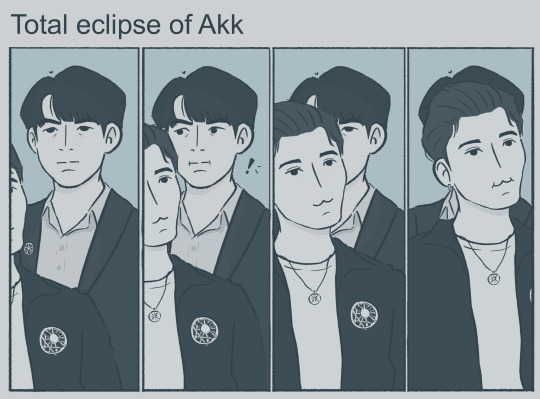
real meaning behind show’s title
insp
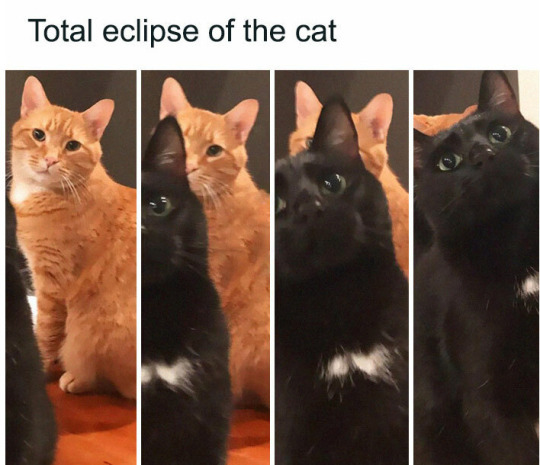
ʷʰᵉⁿ ᶦᵐ ˢᵗʳᵉˢˢᵉᵈ ᶦ ʳᵉᵈʳᵃʷ ᵐᵉᵐᵉˢ ¯\_(ツ)_/¯
#the eclipse#the eclipse the series#my art#semicart#I saw word 'eclipse' and well#this show making me unwell every single week#I don't really like shows set in school but here it absolutely makes sense#using school structure as metaphor for country as a whole#reminded me of aristotle's view on politics and how cities naturally grow from smaller communities#school being a small community should have rules and laws similar to a city or country#but school system don't give students right to decide on anything#and it's interesting to see this main conflict about school uniforms that is about so much more#and ahh I love all these references to famous philosophers and history and literature and also internet#and its role in making younger generations more knowledgeable about all these topics and allowing them to actually regain some power#I like how we see different perspectives on same philosophies#where each person using same source material is able to support their respective believes#like with hobbes#teacher was fixated on ruling aspect of his philosophy meanwhile ayan brought up matter of freedom#that teacher purposefully avoided#but also ayan himself didn't mention fear factor that hobbes considered crucial in creating communities and then countries#ahhh I thought I could draw little silly meme and put all m thoughts in the tags bc im too stupid to make whole serious post about it#but turns out i could only fit some kind of preface here aksjgaksdgakgf#there so many other things that could be said about whole hobbes locke and other philosopher debate from ep 4#and also 1984 like hhhh#I might ramble some more in the future#ANYWAYS#I need to finish more serious eclipse fanart someday that is patiently sitting in my drafts aha
54 notes
·
View notes
Text
SydCarmy vs Lucus


AMBITIONS AND PERSPECTIVES ON ART
This is a long one. Is about the series's themes on pursuing the arts, and the reasons that this ships work as symbolism for it.
When thinking about the reasons Marcus and Sydney were not going to work out (as far as we can see), I read a comment saying: "they are not on the same level" and the more I thought about it, I realized it not only meant they are not equal in culinary expertise, but they also have different ways to "live" their path in the culinary arts, almost opposite philosophies about it. And all of it is explained in their conversations with their (possible) romantic interest.
WHAT IS AN ART PHILOSOPHY?
When you enter a path in the arts, any part, at some point, you will have to make decisions about how you are going to transit this path because there are very different ways to live a creative life, to make money out of it, and how feel fulfilled about it. Many people will enter their path with an idea of what success looks like, probably modeled after an artist that you admired, the desire for your art to be recognized as good, or as "the best," or even to disrupt what came before you. Shortly, art philosophy is how you value your path in the arts: What makes it good art? What point of your career is gonna bring you satisfaction? What guides you to it?
CARMY AND SIDNEY : "LET'S BE THE BEST AND REACH LOST OF PEOPLE"
They both want to be "the best," their definition of it equals stars, reviews, magazine interviews, and restaurant numbers. The creative impulse is only as valuable as is booming, and a chef is only as good as the size of their kitchen.
They both want exterior recognition and aspire to a big audience, and their satisfaction in their craft depends on that; what makes their unbearable jobs worth it somehow is if "people loved the food." They both have wounds and bonds formed around food and love making people happy with the food, but they have selected a perspective of what "the best" is and is an ambition they run almost blindly to. You can think the burger place on your block has the best food in the world. There are cooks utterly content with that, but the Michelling stars are telling otherwise.
Of course, this is the most tangible way to measure success in arts, the singer with the most loved songs, the book with the most readers. Quality is supposed to be evident by popularity, and they want it, decorated with the prize of succeding in such a competitive industry. They have tried to win the culinary rat race and have regrets about it.
Carmy (motivated by the rejection and abandonment from his brother) worked his ass to unhealthy levels to climb the culinary ladder, living to best everybody around him and run the best restaurant on the planet (which, if we believe his monologue, only took two fucking years). Sydney is presented to us as somebody with equal creative powers, intelligence, and instincts as Carmy, which is particularly obvious in their brainstorming sessions. But she hasn't been offered the same opportunities. Her previous bosses described her as "incredibly talented, impatient, and green." and one friend told her as "always trying to be the best." There is much to say about how her impatience may sabotage her ambitions. Still, it may be because she fears getting stuck, labeled, or never recognized by her talents.
These two have 3 things they prioritize in their art paths:
Creative expression+people love the food
Exterior recognition based on the industry standards (stars and big kitchens)
A rat race (sense of urgency) and your ability to play on it.
What makes your food the "best" is comparing it to everyone else and "winning" in a particular category.
Not to mention, they are both deeply aware of the logistics and money sides of the restaurant life. It is not like they don't value inspiration, but their ambition is the defining force behind said inspiration.
MARCUS AND LUCA: "LET'S BE INSPIRED AND EVOLVE"
Luca was introduced to us as someone who was "trying to keep up with Carmy, who was much better than him," the same way the audience feels Marcus is someone trying to impress and keep up with Syd. Luca knows the culinary world, has traveled, and has a privileged position making high-end desserts (possibly in a place with stars). He is the Carmy to Marcus's Sydney.
Btw, there are some crazy parallels here too:
Marcus and Sydney have a wound/fear related to their mothers.
Luca and Carmy have strained relationships with their siblings (Luca has a sister he cannot find).
Both Carmy and Sydney got into it because of early childhood passion
Marcus and Luca got into it by "chance," discovering a passion that they never expected to love this much or be good at.
Mentor x student relationship.
Back to Marcus and Lucas's perspective of art. Notice how Carmy was trapped in a sense of urgency environment, with many people working for him, in NYC, a chaotic city; while Luca seems to work entirely by himself, in a pretty chill environment, in a rather peaceful city. Luca and Marcus thrive on this environment, which is about thought and delicacy, unlike the "efficient, fast run kitchen" Carmy and Sydney established.
Marcus had no philosophy about his craft because he was barely starting. Still, he adopts Luca's philosophy, which has 3 parts:
You may never be the best. Some artists have to let go of the idea of being "the best." There is a lot to say about this. But I want to express this using an example of the craft that I aspire to get into: writing. A friend once told me that some books are not meant to reach millions because they have a very specific audience, and what makes them good is how "memorable they are." More of it, some artists are never recognized in their times. The industry may not be made for them, or it may be just luck. Limiting the value of art by the industry standard is depriving the world of art that needs to be more exploratory, spontaneous, or just free.
Since industry validation may not be available to you, instead of "being the best" against others, you can decide, "My only competition is me from yesterday." This perspective is super important because it gives you something to aspire to, ensures your creative growth, and allows reinvention.
It is not about skill but being open to the world, yourself, and other people. It is not about fancy techniques or recognition but about being inspired.
To Luca and now Marcus, the creative process is as good as is honest, and a chef is as good as the effort he puts into it. The "self-exploration" and the recognition of the people surrounding him allowed Marcus to create his desserts: The Copenhagen sundae, for his ultimate school (and Luca), "Mum's" honey bun, Sidney's donut (the first one in believing in him and when he recognized his dreams), and "The Michael" the one that put him to make bread, and the tribute that needs to be made.
#sorry I just love stories about making art#the bear is a love story#carmy berzatto#sydcarmy#carmy the bear#the bear meta#carmen berzatto#sydney x carmy#carmy x sydney#luca the bear#marcus the bear#lucus#chef kiss
137 notes
·
View notes
Text
On the Disconnect Between ATLA and LOK: Or Why Reactionary Centrism Ruins Everything
I’ve made it no secret that I’m no fan of LOK’s writing for a number of reasons. But today I want to focus on only one issue: its politics.
I am baffled as to why LOK is seen as being the more “woke” story. Just because the protagonist is a buff brown woman with a female love interest (only implied until the comics, really)? This is such an incredibly shallow reading focusing only on aesthetics and ignores the actual content and philosophies LOK espouses.
But let’s not get into religion, iconography, the effects of colonialism and westernization etc, or we’ll be here forever.
Instead let’s just focus on the politics.
The Forge
Part of the disconnect between ATLA and LOK are the cultural conditions in the USA when both were made. The forge from whence they came was quite different.
Avatar: The Last Airbender
ATLA criticized imperialism.
If this show had been made during the height of Manifest Destiny, or during our super fun times illegally annexing territories (like Hawaii), it would’ve likely struggled to tell its story as well as it did. It would’ve been far more controversial and likely would’ve needed to take a more “centrist” approach, making it seem like imperialism isn’t “all that bad”.
It might have even come out and said that it isn’t imperialism itself that is the problem, but that Sozin to Ozai were big mean dictators that did it the wrong way!
But because ATLA came out in the 2000s—during a time in which the world had widely come around to thinking imperialism is kinda some super villain schtick—it was easy for the story to focus on the perspective of the victims of such campaigns and tell it from this point of view.
We don’t get long segments of feeling sorry for Ozai, now do we? The closest we get is Azula, who herself serves as a victim of this war that has consumed her childhood and deprived her of a safe, loving environment in which to grow and develop, instead having been groomed into a living weapon for her father and nation’s war machine.
So now let’s compare this to LOK.
The Legend of Korra
What does the first season of LOK cover? Collectivism, social activism, civil disobedience escalating to acts of violent defiance against the state.
What was going on in the USA in 2012 when LOK came out?
Occupy Wallstreet.
Socialism vs capitalism, the 99% versus the 1%, civil rights and equality; these are all issues we are still grappling with today. They’re highly politicized and divisive. There is no universal agreement about them.
And so LOK had no “safe” villain or “evil” ideology to combat. Instead it had a complicated and widely divisive topic to tackle that was contentious then and continues to be today.
As a result? Too much time is wasted equivocating.
Both Sides Are The Same! (But Not Really)
We get some soft worldbuilding early on in Book 1 of LOK showing how the infrastructure of this city is built to benefit benders and box out non-benders, but this is never given real focus. We SEE how the trains and police are dominated by earth/metal benders, we SEE how factory jobs employ lightning benders, while non-benders live in the slums which subject them to violence. But none of this is ever the focus or the point.
Almost as if the show is afraid to make a real critique from the perspective of the working class or an oppressed minority group.
Instead the story quickly falls off a cliffside as every tired old pejorative thrown at communists is recycled for Amon.
His sympathetic backstory is a complete fabrication meant to hide that he is actually part of the oppressor class.
They pretend to be the powerless oppressed group, and yet have the funding of the richest industrialist in the city?
The rich industrialist is a member of this supposedly oppressed class but really he’s just a secret villain looking to change the world for his own personal reasons and not to protect his fellow nonbenders (these same accusations are thrown at Jewish people re: Marxism).
There are no sincere attempts to communicate their grievances sympathetically or build a coalition or garner public support. Instead The Equalists only use violence, fear, and other oppressive silencing tactics.
The desire to make everyone equal by “stealing” people’s individuality. (The old “make everyone equal heights by cutting tall people’s legs down” chestnut).
And more!
This is kinda bonkers propaganda if you’re looking at it from a left-wing perspective, right?
And it seems weirdly incoherent if you’re trying to look at it from a right-wing perspective, especially with Tarrlok standing in as the villain “on the other side”.
But it makes PERFECT sense as an enlightened centrist horseshoe-theory piece that can’t commit to either side and has to warp and undermine its own story to fit a “both sides are wrong” message. Heck, it’s so heavy handed it even made Amon and Tarrlok brothers!
This is the problem that plagues all of LOK.
Look at the other villains too!
Amon: Civil Rights Activist or Bad Faith Opportunist?
Amon
Pretends to be: A civil rights activist for an oppressed minority group.
Is actually: A bad faith actor whipping up a small or non-issue into a much bigger one and convincing people to turn on each other for his own personal gain/revenge. Once defeated, the problem disappears.
Electing a non-bender somehow makes everyone happy and the problem is never addressed again. Just like electing Obama ended racism! Oh wait…
Unalaq: Spiritual Environmentalist or Environmental Satanist?
Unalaq
Pretends to be: A spiritualist concerned about the environment and the spirits. Basically Al Gore meets Tenzin Gyatso but willing to start a civil war over it.
Is actually: An occultist weirdo who wants to fuse with LITERALLY SATAN and usher in 10,000 years of darkness or something, and willing to start a war over it.
In an attempt to make a spiritual foil for Korra, who struggled with the spiritual parts of being the Avatar, the story took a weird turn and made a choice widely regarded as “fanfiction on crack” by having Unalaq aspire to become “The Dark Avatar”.
But it’s okay, you see, because while Unalaq’s criticisms of waning spirituality and lack of protection of holy sites could be seen as a knock against environmentalism, by the end Korra recognizes that Unalaq had a point and that the spirit portals should be left open.
So why exactly did Unalaq want to be the Dark Avatar and usher in an era of darkness? How was that supposed to resolve the problem he presented and Korra ended up agreeing with?
It doesn’t, and once again we are left with a contradictory centrist message of “protecting the environment is good but you should be suspicious of anyone that actually advocates for it”.
Also thanks for demystifying the origin of the Avatar and ruining the original lore for where bending came from with your Prometheus/Christian allegory. Ugh.
Zaheer: Spiritual Guru Fighting Against Modernity or A Charismatic Dummy Who Learned Everything About Anarchy From a Prager U Coloring Book
Zaheer
Pretends to be: An anarchist seeking to bring down oppressive regimes, therefor resetting the world to a more egalitarian time
Is actually: An idiot who doesn’t even know the difference between an ancom and an ancap and has no coherent ideology. He just wants chaos, I guess, which isn’t whah anarchy or anything is about.
Perhaps realizing they messed up so badly with Unalaq that even the creators were unhappy with the results, they attempted the spiritual foil idea again with Zaheer.
This time they actually had a writing staff which makes this season the agreed upon best of LOK.
But the tip-toeing around making any actual criticisms and falling back on the “both sides are bad” cop-out are only exacerbated by how uninformed and nonsensical Zaheer’s actions are. Not unlike Amon, he takes none of the steps an actual activist would take. He never even speaks to the people of Ba Sing Se to find out what they need or want. He just kills their leader, announces it, refuses to elaborate, then bounces and lets the city tear itself apart in the power vacuum.
It’s an entertaining spectacle! Just like his later torture of Korra is visceral. But none of it has any real substance to support it and so the horrific acts he commits feel like senseless edgelord tantrums.
Even Bolin knows it. Once Zaheer is defeated, Bolin shoves a sock in his mouth, therefor cementing Bolin as my favorite of the Krew for all time.
Kuvira: Literal Nazi or Literal Nazi but she didn’t mean it!
Kuvira
Pretends to be: A fascist, putting people in labor camps and uses the equivalent of an atom bomb to crush her enemies under heel in the name of unifying the continent under her control.
Is actually: All of those things but she had good intentions! She just went too far! Give her a slap on the wrists because her and Korra aren’t so different, you see!
Perhaps the most bizarre writing choice was to make the fascist the only truly sympathetic villain of this series. The reasons become quite clear, however, when we recognize one thing.
Yes, she’s styled after the Nazis.
Yes, her actions in modern day are more reminiscent of Russia.
But who is the only nation to have ever used a weapon of mass destruction on the level of the atom bomb? The USA.
And here is where the unwillingness to make a bold criticism or take a hard controversial stance is the most apparent.
Kuvira acts like a fascist and has a lot of Nazi-vibes, but she is also a grim reminder of the USA’s own imperial history. Of our flippant use of a horrifying technology that still continues to have consequences for the descendants of the victims even today. It is one of the worst violations of human rights and decency in history. And the USA is the only nation to have ever actually used one.
So if you ever feel it’s weird that Kuvira was arguably the worst of the villains but got off with only house arrest and a happy ending with hugs from her family? You’re not alone. Kuvira has to be “not that bad” or else you’re critiquing the USA itself. And that is a level of controversy this franchise doesn’t seem interested in dipping it’s toes into.
It’s the reason they equivocate and justify by having the Earth Prince step down and choose democracy. This isn’t an East Asian ideal. This wouldn’t have been a popular or virtuous choice in that time period. Many would’ve regarded it as tyranny of the majority, or a disorganized chaos without a consistent central authority.
It’s only seen as the perfect solution in the Democratic West. So you see, it’s not so bad, because at least we have democracy! We aren’t as bad as Kuvira who really isn’t all that bad either! Or so the narrative tries to apologize for itself.
And this is even more apparent with everyone’s problematic fav!
Varrick: How Elon Musk Wants Us To View Him vs What Elon Musk Wishes He Was
Varrick!
Is presented as: A quirky, funny, Tony Stark-esque genius who made a mistake and deserves a redemption!
Is actually: A war-profiteer willing to escalate tensions and shed the blood of his own people with no remorse to make money. Also he builds the equivalent of the atom bomb for Kuvira and her allegorical Nazis. But he gets a happy ending with a weirdly westernized wedding anyway!
Isn’t it telling that the villain who is written to be the most loveable and sympathetic is, in fact, the capitalist industrialist?
And not like that yucky evil industrialist Hiroshi Sato funding the Equalists and their civil rights movement.
No, no! Varrick is the good kind of industrialist! The kind that is non-political and mostly cares about money and inventions! After all, he only built a weapon of mass destruction for the Nazis, not the civil rights protestors!
Which brings us to…
Our Civilized Poverty vs their Savage Poverty!
And hey, that’s fair because look at the differences between Republic City and Ba Sing Se!
Sure, both had destitute populations starving and without proper shelter due to the disconnected elite leaders who didn’t care about their plight.
But the homeless people of Republic City are presented as jolly and helpful and never state a single grievance even as they live in a tent city underground! Everyone knows that democratic poverty is better! Therefor Sato was totally unjustified in funding an equality movement!
The poor people of BSS, on the other hand, are victims of that mean old non-democratic Earth Queen and later of the power vacuum left by her assassination, therefor their plight is ACTUALLY horrific. Kuvira may have been bad but she and Varrick are justified because of the unAmerican conditions!
Looking at it this way, so many of LOK’s problems fall into place. It perhaps serves as lesson in not tackling complex problems with the intention of a clean solution unless you’re willing to take a controversial stance and stick to your convictions.
I don’t think the creators intended to make a libertarian criticism of every social movement and apologia for capitalism and fascism. It’s just a sad reflection of what is and isn’t controversial in our current society. Divorced from actual morality or perspective.
What a waste.
This Post Brought To You By: Viewers Like You! (or: Check out this thing I made)
All that said, if you want a well-written and more adult take on the ATLA universe, check out the Kyoshi and Yangchen novels! F. C. Yee doesn’t pull any punches and perfectly balanced the darker, more visceral elements an adult story can have, with expert worldbuilding and humanized characters that feel believable even when they’re in fantastical situations.
Or if you want more ATLA instead, kindly check out @book4air: A project creating a pseudo Book 4 using both the official comics and original materials, fully dubbed, orchestrated, and partially animated by industry pros who happen to be fans!
Some comics are getting rewrites too, so whether you love the comics and want a fresh take, or hate the comics and want a change, we are doing our best to make this accessible for everyone including people with disabilities who may not be able to enjoy the originals.
Check out our first episode here!
If you can afford to, consider supporting us on Patreon! Every episode is expensive to produce and we are a bunch of broke artists. Some which don’t even have consistent or reliable housing. Any little bit helps.
If you can’t, no worries! You can still help by spreading the word so our videos can overcome the YouTube algorithm.
With all my love for this franchise and its fandom, I hope you all continue to enjoy your favs regardless of my criticisms.
201 notes
·
View notes
Note
Do you think Aang is a neglectful father to Bumi and Kya II?
going from just what we are shown in legend of korra through kya and bumi’s perspectives? yes. not intentionally, of course. but it’s important to recognize the amount of hurt that aang caused his children, to the point where tenzin’s idealization of him starts to falter, and he acknowledges that his father isn’t as perfect as he thought he was (or wanted him to be). don’t get me wrong - I think the fandom tends to exaggerate parts of aang’s parenting. like comparing him to ozai? that is the most ridiculous thing i’ve ever seen. but i also see pro meta glossing over kya and bumi’s concerns with him, which isn’t right. there needs to be more nuanced perspectives than “he was as bad as ozai!” or “kya and bumi really were just overexaggerating their grievances with aang. he was a great dad!”
i think here is where it’s important to discuss authorial intent: bryke have said that they had not meant for their writing to come across aang being a bad father who set out to intentionally neglect his children. rather, kya and bumi’s concerns and resentment likely stem from how they perceived his role to the world. legend of korra as a series offers a meta commentary on living up to legacy, the legacy set by the heroes in avatar the last airbender, and the legacy of living up to a critically acclaimed predecessor series. kya and bumi’s concerns also stem due to legacy: the legacy left behind by aang and how the world views their existence in accordance to this legacy - as the non-airbending children to the last airbender. kya and bumi feel that they deserve the right to be part of their father’s legacy (and they do) just as much as tenzin. i don’t think their insistence to be part of avatar aang’s legacy is due to a desire for prestige and fame, as they’ve spent much of their lives shying away from their father’s legacy. i think it’s out of a genuine realization that they are grieving and missing their father and want to celebrate his successes.
in print media, we actually get a different perspective to his parenting. kya and bumi offer good words about their father (mostly). in turf wars (2015), kya shares how he was “nothing but supportive” in relation to her coming out. she offers some interesting lore about same sex relationships among the air nomads, likely quoting something that her father could have directly shared with her. in avatar legends, it is confirmed that aang did teach both kya and bumi about their air nomad heritage, and kya internalized his lessons on philosophy, meditation, and balance:
Although she developed a slight resentment toward Aang for teaching more to Tenzin about his culture,[3] Kya internalized some of her father's lessons on philosophy, meditation, and balance.[6] She developed a stronger connection with Katara, who taught her to develop her waterbending combat and waterbending healing abilities to proficiency.[3][6] - Avatar Wiki
in bumi’s recent comic called the cat owl’s cradle (2022) released in patterns of time, i was surprised to find that bumi held a much more favourable perspective towards his father than before. he thinks about his father’s great smile all the time and tells his nephew that meelo’d smile reminds him of his father’s. he mentions that aang and him used to go fishing (a water tribe practice). he’s understanding of his father’s many duties to the world; why - as the avatar - he often didn’t have infinite time in the world to spend with him. most importantly, through the advice he offers meelo, it is evident that bumi has realized that an absence of airbending couldn’t possibly make his father love him more than he already did - that he is fine the way he is, with or without airbending. in this story, we discover a vast growth in bumi’s self-confidence, as he no longer feels a sense of inadequacy, in his own skills and in his father’s eyes.

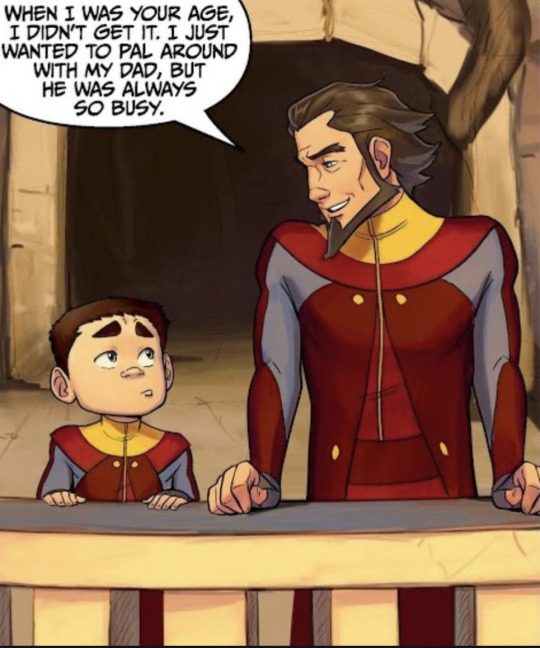
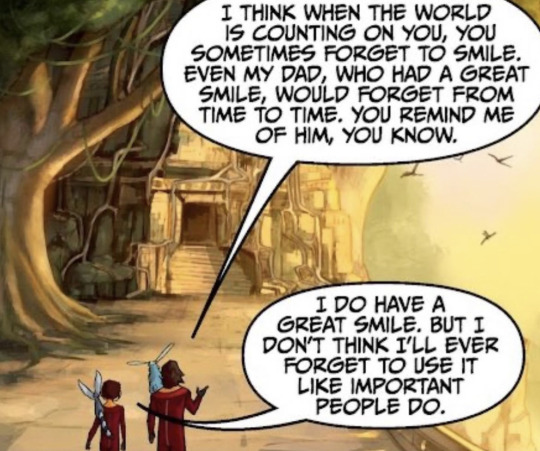
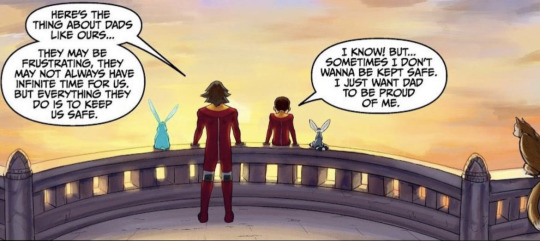

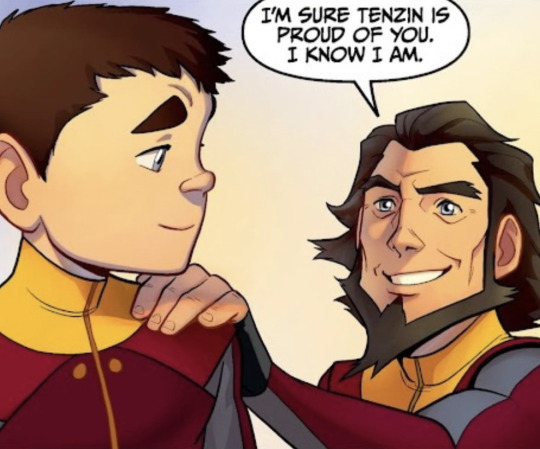
to answer your question: if you were to only watch the legend of korra, i can completely see why you’d arrive at the conclusion that aang was a negligent father who deliberately focused on his youngest child over his other non-airbending children. if you factor in print and comic media, it tells the story of a father who was trying his best to balance his responsibilities to the world and his personal life, succeeding in some ways and failing in others. at the end of the day, it seems like kya and bumi’s genuine love for their father overtakes their grievances with him. what’s interesting is that it’s not like an “he’s my father so I’m obligated to love him” type of love. it’s more along the lines of, “yes we have our issues with him but we do believe he loved us wholeheartedly and we want to be included in his legacy.”
now, just because i’ve grasped (after so many attempts) on what bryke was trying to do in korra does not mean that i don’t have my fair share of issues with the way bryke went about writing that storyline. i dislike the fact that they blamed the fandom on the overexaggeration - if all sides of the fandom came out with the take home message that aang was a deadbeat father who gatekept his culture to his literal family, the onus is on your writing, not on the fandom. the balanced perspective years later in the comics is appreciated, but we definitely needed to see this in the show from the get go.
ultimately, if they have an interest in redeeming aang’s arc as a father (which i suspect they might want to do given post-korra material), they need to show us, rather than just tell us, that he wasn’t as bad as how korra makes him out to be. the perfect opportunity for this is in this upcoming adult gaang movie with the birth of baby bumi. we have no details surrounding this adult gaang movie, so i don’t know if bumi will be in it or not. but it is the perfect opportunity, if bryke are interested in going that route.
I will end off by saying that i’d rather have aang as a father than my own any day lmaooo.
125 notes
·
View notes
Text
Why Katara's Acts of Kindness towards Zuko differ from others
I recently received a reply on one of my posts where I stated that Katara was the first person (besides Iroh) to show Zuko genuine kindness and compassion, in the 'Crossroads of Destiny' when they were down in the Crystal Catacombs.
The comment state that Aang was the first person to show Zuko humanity (Episode 13, The Blue Spirit; Episode 20, The Siege of the North, Pt.2) and even brought up other characters that we see throughout Zuko's journey such as: Song and Jin.
And whilst yes, these characters did show Zuko concern, care and warmth, it differs greatly to Katara's own.
Let's begin with Aang:
Aang's character is motivated and driven by the Air Nomad teachings, philosophy and morals and one of his core principles that he follows is "all life is sacred'. In 'The Siege of the North, Pt.2' - he saves Zuko because he cannot allow another living being to die, especially when he can prevent it by simply saving him from the winter cold. It's part of Aang to save people - no matter how much wrong they've done.
In 'The Blue Spirit' - Aang once again saves Zuko - and not only because of his moral compass because Zuko had saved Aang from Zhao. They have a moment to talk once Zuko awakes, and Aang questions if had the circumstances were different between them, could they have become friends. Aang, in this part of the story, is very childish and believes that everyone has good to them; he's also someone that seeks friendship and attention - and it plays into his character that, as he mourns his lost friend Kuzon, he thinks of a potential friendship with another firebender: Zuko.
So Aang's compassion and kindness comes from a place of morality and of loss.
With Jin and Song - I won't reflect too much on their acts of kindness given that, in that moment of Zuko's journey, he was secluding his true identity. In both of these womens' perspective, Zuko wasn't the Fire Nation Prince. He was Lee, an earth kingdom refugee, a victim of the war, someone like them. Had they known Zuko was a member of Fire Nation Royalty, I'm certain their reception wouldn't unfold as it did.
Now with Katara...
Katara knows Zuko. To Katara, Zuko is the face of the enemy, the face of the opposing side of the war, the face of evil. In that precise moment, Katara had her mother's necklace "stolen" by him; had her home ambushed by his fleet and her grandmother threatened by his very hands; she'd been chased down by him and they had fought multiple times before. They relationship at that point is hostile, fueled by hatred.
And Katara is also a character that doesn't forgive quickly. Unlike Aang, Katara doesn't follow the same moral compass and she doesn't seek out friendship in the enemy that took her mother; the enemy that led her Father to fighting in the war and abandoning his children; the enemy that tried time and time again to kidnap/burn/kill her friend and the Avatar... Katara's unforgiving with Zuko because:
Katara: It's just that for so long now, whenever I would imagine the face of the enemy, it was your face.
Yet, despite all that, when Zuko reveals his loss and empathizes with Katara's own loss of her mother; once he reveals himself more vulnerable, small and defenseless than he has ever been before... Katara shows him compassion, apologizes for her outburst and offers to heal Zuko's scar. Because, though it's in Katara's nature to hold a grudge towards the enemy, it's not in Katara's nature to hate blindly. She's a caring, loving and patient person - and she quickly shows Zuko all those attributes.
It's the first moment in the story that Zuko has received unadulterated humanity and sincerity (despite all the hurt he'd brought to Katara and her friends).
Katara was the first person to forgive Zuko. It was the first glimpse into the start of his destiny to bring honor and forgiveness towards the Fire Nation.
And that is why I believe that Katara and Zuko's destinies were linked to one another. Katara would have never dispelled the demons and trauma of her past had Zuko not aided her in searching for Yon Rha; And Zuko would have never become Fire Lord and uphold his responsibilities and destiny - had Katara not fought beside him and showed him that he could be forgiven.
#zutara#zutara long post#zutara analysis#anti kataang#anti bryke#does this even make sense#I ramble a lot and sometimes that means my ideas don't stick or my points don't connect#hopefully I get the general idea across#IDK man#I just love Zutara's connection and relationship
282 notes
·
View notes
Text
So while rewatching the live action trailer a 50th time i kind of started thinking about something.
There's a few moments in atla that always seemed untouchable to me. Not only because they were well executed when it comes to storytelling, but also bc we never actually see the moments in question. Examples are: the attack on the air temples, Ozai burning Zuko, Katara's mother's death. We hear about these from other characters who happened to be there, or in case of the air temples: we hear the moment being retold as history. It's the latter i want to expand on.
The original cartoon never shows us even a glimpse of the attack on the air temples. You could say "well it's a kid's show they can't show a brutal genocide" but honestly, we're talking about a cartoon that showed a skeleton on screen in the third episode, showed the main character getting electrocuted and plummeting to his death, and showed a man being drowned by a spirit. The reason they didn't show it imo, is because it makes sense for the narrative. This attack was a century ago. Everyone that witnessed the attacks and was old enough to remember them is dead. Bumi is the only person we know of that was alive at the time and old enough to somewhat remember, but he wasn't present. It's comparable to world war one for us. There's nobody alive currently that properly remembers WW1. We're being told about it in history class, we get shown those weird black and white videos of smiling soldiers on their way to their death, pushing carts through the mud, them shooting a few canons, the trenches etc. But there's no first hand recollections. The creators really drove home the point of the airbender genocide being ancient history to the current inhabitants of this world by never showing us the attacks itself, and only having it be a known historical fact. It's just something that happened, it was long ago, nobody remembers it. All they know is there's no more airbenders, they're extinct, and nobody remembers jack shit about airnomad culture and philosophy except those that study it (aka professor zei) and even then, it's based off of destroyed architecture and hard to find historical texts that i'm sure the Fire Nation tried their best to erase. The viewers of the show only get information about air nomads through Aang, and whatever flashbacks from his own memory he provides. It leaves us wanting to know more, and it feels extra tragic knowing we'll only have Aang to rely on to tell us the tales of his people (for atla specifically, i know we now have more info due to the avatar novels).
Netflix however, literally opens their trailer with three shots of the attack. The comet, then the fireballs being shot, then the firebenders and airbenders facing off. I don't like this decision to show the battle that took place, because then the point of it being ancient gets a bit lost. We as the audience get more information than the main characters have, and idk but to me that kind of ruins the experience?
Same with Zuko getting his scar. Not only are they gonna show us that, they put it in the trailer. Why? This is a very important character moment in the show that we don't even get to see bc it's told from Iroh's perspective and he looked away the moment it happened. Before this we were given crumbs as to how Zuko got his scar. And Netflix is just tossing it our way like Peeta tossed bread at Katniss Everdeen.
I might feel differently abt this when the show airs (although not likely lol) but currently i'm just kind of mad at these creative decisions being made man
77 notes
·
View notes
Note
thoughts on non-dualism?
non-dualism and manifestation.
i don’t think non-dualism and manifesting with the law of assumption (according to neville goddard) go hand in hand.
non-dualism — as far as i have understood — states that everything is consciousness, pure consciousness. it’s a philosophy that underlines how the outside world is not separate from the individual and how you are one aka united with your surroundings.
i think the ideology itself resembles our perception of consciousness a lot which is why people start to think that consciousness according to the law of assumption is the same as consciousness according to the non-dualistic belief.
it sounds very similar to how everything stems from your imagination and how your physical reality is just the final embodiment of your accepted thoughts.
however ...
1. non-dualism initiates that everything is pure consciousness.
what we consider to be "pure consciousness" is a state. just like every other state, you can embody pure consciousness. it is also called the "i am state" or "the void". according to neville goddard‘s perspective, you aren’t pure consciousness all the time. for those who know about how the void — in other words — pure consciousness looks like, we know that we completely leave our physical body and the entire physical world and become one with our thoughts… pure consciousness. therefore, our idea of consciousness is inherently different. yes, technically, we are still consciousness. but we also live in our 3D, we experience life through our senses, through our bodies… those are things that condition our state of consciousness which is why most of the time we identify as "conditioned consciousness".
2. the idea of the 3D being a reflection of the 4D doesn’t exist.
see, non-dualism itself doesn’t tell us nothing about manifesting. there is simply no manifesting.
3. therefore, it doesn’t regard the law of assumption.
there simply is no operating law that depicts the cause of why you are able to manifest in first place — meaning, only consciousness exists. you do not assign meaning to it. consciousness, in this case, does not uphold the power to materialize your desires or the idea of shifting realities isn’t really present.
4. it suggests that the law stems from our consciousness.
i read this somewhere but thinking that the law of assumption is a product of our consciousness doesn’t make a lot of sense. we all operate under the same law. and that law assigns power to your consciousness. if the law was simply made up by your consciousness, you wouldn’t be able to manifest. see, the law is a universal law, a principle that cannot be changed. how do you think people manifest who don’t know about the law? they still manifest through their assumptions. you don’t just start to manifest once you find out about the law. you much rather realise that you have been (unconsciously) manifesting your entire life and can now choose to do it consciously.
conclusion.
non-dualism is an outlook on life, a philosophy, an ideology that shares similar views on consciousness as manifestation with the law of assumption. but those are not quite the same and cannot (in my personal point of view) be combined with the idea of manifesting. we already have a perspective on consciousness (pure and conditioned) which i think makes a lot of sense already. there is no need for an additional or different view on consciousness, especially when it contradicts the initial viewpoint of manifestation.
i want to apologise in advance for any mistakes in this post. i have known about the idea of non-dualism before but never truly did my research until recently. if you spot any mistakes, please feel free to comment and correct me. also, if you practice manifestation with the use of the law of assumption and still share non-dualistic beliefs, i am the last person to judge you. it’s up to you what you want to believe in, especially if this mindset seems easier for you to grasp.
with love, ella.
#law of assumption#neville goddard#loassumption#manifestation#manifesting#loa#the law of assumption#manifest#spiritual#spirituality#non dualism#how to manifest#manifest your dreams#affirm and persist#affirmations#law of attraction#manifest your life#loablr#manifest it#loa tips#loa blog#loa success#affirmyourreality#shifting community#reality shifting#shiftblr#reality shift#void state#i am state#pure consciousness
167 notes
·
View notes
Text
Been thinking about it partially as I come closer to it in fanon S6 / divergences where what I'm writing (in prose with zero constraints) vs what I think the show is actually more likely to do (such as in this case) with the Celestial elves because like
If we look at it just from a storytelling standpoint, there's a few things we want to take into consideration.
Why Skywing elves?
Despite being an aspiring and then full fledged Sky mage for most of the series (5 seasons) as his defining... career trait? with Ocean only added at the end, Callum's attachment to the Sky arcanum is incredibly important from a thematic standpoint. I talked about this in more detail in terms of how TDP writes from theme to begin with, but it would not surprise me if a lot of the series fell into place after decisions were made regarding "mage boy has Sky-Freedom powers" and "big endgame big bad is Stars and Destiny embodied," i.e. like what kind of dragon Zym would be in order for Callum to have a reason to sacrifice his primal stone, why have Callum learn Sky magic first, etc etc.
The Celestial Elves, presumably, could've been any group of elves. We know from Tales of Xadia that Sunfire elves had a chant about warding off dangerous Star dragons from the Great Orb, and that Karim-Pharos are poised to be future pawns, so there is a decent link there. It also could've been cool if the Celestial elves had had elves from all over, showing both intergroup workings and that the Stars were bringing them together in some manner.
If Sky and Skywing elves by thematic extension represent Freedom, then it makes sense for these to be Skywing elves who have perhaps forsaken notions of freedom for ideas of pre-determinism or destiny, i.e. our circumstances beset all of our choices, or that fate/destiny is real and unchangeable. To have the same arcanum and similar abilities as Callum, but to already be warped to Aaravos' will / thematic graces of destiny and fate - to amplify what he's scared of and to accentuate what he might become (at least in terms of what he's scared to become).
On that note, I think it makes sense for them
To be Antagonists
Partially this is because of precedent. Most elves, when in groups, have been more antagonistic with one or two rising to the forefront to be allies. We see this in arc 1 with Moonshadow and Sunfire elves, with the majority being antagonists especially at first (the assassins, the Sunfire soldiers) with Rayla, Lujanne, and eventually Janai being allies / exceptions - even if the Sunfire elves as a whole quickly switch to being allies as of 3x08/09. We see this again in S4 with the Drakewood Earthblood elves being mostly antagonists, Terry as more of a grey area, and only N'than (and possibly Mukho the Mushroom mage?) being downright allies. This would mean that Astrid and maybe another Startouch elf might be more sy
Plot / Misc Reasons
Of course, the biggest reason for the Celestial elves to exist is to, presumably, give exposition regarding Startouch elves to the main characters and to extradite subsequent views / philosophy about Star magic and the arcanum (arcana?). If they are loyal to Aaravos, they would likely provide a perspective on Startouch elves different than one Callum might be coming in with and give more credence / context to Claudia's assertions of Aaravos as well, given that she's the one character currently with a positive view of him. It also doesn't seem they can entirely be good guys given their 1) isolationist nature and 2) having not one but two super OP objects that the protagonists definitely need. While they may not end up being villains, I think we can somewhat safely assume they will initially be obstacles, if only in giving tests (of love) like another certain Startouch elf...
31 notes
·
View notes
Note
What brought you to bring your book on heads? I just finished Stiff by Mary Roach, and it’s super cool to see someone interested in the same stuff!
I’m just starting on Over My Dead Body by Greg Melville, which you may like - it seems like it will cover a lot of the same questions about the meaning behind the different ways we treat human remains
i've always been fascinated by death, i think partly because it's always been a strong presence and influence in my life (even my birth was heavily surrounded by the shadow of death and there was no certainty that i would make it), and partly because i've always gravitated towards things that other people turn away from, to the taboo and the macabre and the horrifying, because i don't want other people's judgements to inform my opinions on and understanding of something without getting any firsthand perspective, because i find that hypocritical and impossible to justify to myself, and because i know how it feels to be misjudged and shunned and told that it's just because you're inherently offputting and wrong. i have this insatiable need to know things and an obsession with trying to understand what compels people to behave and think and feel the way they do. it's never enough for me just to accept what i'm told about something and not question or examine it at all. also i'm just a little bit of a sicko who likes weird freaky shit and gets a thrill out of treading the fine line between disgust and excitement and testing my personal boundaries.
and i guess death is something i'm particularly drawn to because it's the ultimate combination of the taboo and the unknowable. it's an extremely personal, polarizing and influential part of life, society and culture. there's just so much there to study and question and interpret and it's continuously evolving, and its inevitability and significance in our lives means that will always continue to be the case. death is also very influential in all of my favorite subjects - english literature, history, psychology, and philosophy - so it overlaps with a lot of my other interests.
stiff by mary roach was actually one of the first books that got me hooked on reading more about death, dead bodies and dying, actually! also ask a mortician on youtube, and to be honest, the tumblr bone stealing scandals. autonomy, consent and self control are very important to me, and being denied them is something i personally find especially horrifying, so when confronted by the realization that the dead are especially vulnerable in that regard, and the ethical debates as to what is an acceptable way to treat the body after death, i became obsessed with learning as much as possible. i wanted to master my fear rather than letting it control me.
thanks for the book rec! that sounds really relevant to my interests ^_^
124 notes
·
View notes
Text
The Sounds of Nightmares episode 4 analysis: Head in The Clouds
HOLY FUCK, ACTULLY HOLY FUCK, BEST EPISODE ,BEST EPISODE
Forgive me, now that I've disposed of the build up of hype, we can sort this into two parts, what this means for TSON and for LN3
The young blood:
Given this is our first exposure to teens in Nowhere, and Noone's comments about them "being there for a long time" we can safely say they've at least partially turned into residents, especially with how they're being conditioned to only see themselves as their given roles.
Considering the series is implied to be the earliest point in the timeline so far, I'm wondering if we might see the magician and fire breathers as adults when LN3 launches, though I'm highly doubtful we'll be seeing Rusty alive.
A place of joy in the sky:
The idea that the Circus is an airship definitely one I didn't consider before, but makes it's similarities to the Maw much more interesting.
On a side note, Noone describing the Fairgoers as having faces like bad drawings lines up with the lumpy looks of their faces we see in the trailer, further proving it's the same places.
Double act:
Now on to who I'm sure would be delighted to be called the main attraction, the Ventriloquist(s?)!
No two ways about it, they are HORRIFYING, and line up great with Tarsier's old philosophy of making Residents look like grisly version of childish misunderstandings of what they represent.
Gameplay-wise I have a suspicion one may function like an alarm, alerting the other of our presence, though I may be completely off on that. From a lore perspective, it fells very LN-like to not clarify if they actually run the Circus or not.
The (not quite) best boy:
Rusty was a pretty great companion to Noone in this trip to Nowhere, he seems to be the most capable kids she's met so far (no offence, episode 1 kid whose probably RK). His confession of fear and hate in the ferris wheel might imply he was closer to becoming a resident than the other kids we've met so far.
The absent local:
Our slightly blobby old friend not appearing was a slight surprise, though he's certainly there in spirit, it helps that he's all but confirmed to actually hail from Nowhere, further solidifying my theories regarding him.
Noone's allegory:
Noone describing the Nowhere as a place with many connected but individual places with unique functions confirms, at least to me, that there is no central force controlling literally everything, rather, there a forces the drift from region to region, upkeeping the nature of the world as a whole-
A few notes:
Since every episode has a different color for the background, I'll go out on a limb and say the finale will be yellow, for fairly obvious reasons, leaving green as the most likely color for episode five.
The idea of fleeing the Circus (in chapter FOUR) reminds me of @queen0fm0nsterz idea that one of the cancelled LN1 comics would be about escaping a facility, and that it would parallel the FOURTH Lady, might be nothing, or it might be a sign we should revisit past episodes with the Ladies in mind.
#little nightmares#ln podcast#the sounds of nightmares#ln Noone#ln Rusty#ln vetrilouquist#ln Ferryman#ln3#ln 3#little nightmares 3#ln Lady#ln the Lady#I'm so fucking hypeddddd
61 notes
·
View notes
Note
Had a question that you'd probably know the answer to, when "the darkness" told everyone's least favorite bajillionare (Clovis) to go to Europa, was that actually some facet of the darkness reflecting his consciousness or whatever, or was that the witness telling him to get his ass over there? If the latter, what was it trying to accomplish?
Also if it's not too much trouble could you cover the same question for other instances of "the darkness" talking to people? While writing this Eramis popped into my head, but I'm sure there are other occasions in like the black garden or something
Thank you!! :3
It was the Witness! We know now that the Darkness as a whole doesn't really have any specific agenda: it's simply a part of the universe, a paracausal power that deals with memory, history, emotions and so on. It can be used in many ways and the Witness uses it in this specific way as a negative force we've most closely associated with Darkness until now.
The Witness spoke to him through the anomaly that was found on the Moon by the K1 research team in the Golden Age. The anomaly was a black sphere discovered in the lunar tunnels (and we still don't know how it got there, possibly with the Hive; there's some indication that the Hive were already on the Moon towards the end of the Golden Age). The sphere was described as an antenna that was capable of communicating with something across the universe.
Clovis specifically had Braytech seize the anomaly and build a containment for it (you can see it on the Crucible map, Anomaly); presumably, this is also when he received the communication from it. He says the following about it:
The lunar artifact promised me a solution to the
indifference of the cosmos. It told me I was unlike all others—and, damn false modesty, damn vanity, I am different! Not for my present qualities, but for my future influence. I shine with noon's light, reflected back through time to this age of dawn.
Essentially, the Witness did what it always does. It picks someone who can be easily manipulated and corrupted, and then tries its best to get them to follow its philosophy and potentialy join it as a disciple. Clovis was an easy target as he already perceived himself as better than everyone else and the only one worthy of existence. You can also see in this quote how uncannily his perspective aligns with the Witness: "solution to the indifference of the cosmos." Both the Witness and Clovis wanted something more; they could not believe that the universe is random, indifferent and meaningless. The universe had to lead somewhere and it had to lead them specifically.
Clovis wanted to transcend humanity and create a "better" version of humanity which the Witness promised he would be able to do with Darkness, as well as with the help of the Vex. He was led to Europa to complete this and create the Exos. Exos, in turn, have a direct line to Darkness, something that would've surely benefitted the Witness in the long run if Clovis' work reached its conclusion: replace the imperfect humanity with Exos who are susceptible to corruption and control, maybe even merging with the Witness.
This is interesting in retrospect now that we've had Veil Logs where it was revealed that the Veil had an extremely adverse effects on the Exos, essentially rendering them useless vessels. Maya Sundaresh was also able to use them to fabricate consciousness into an Exo vessel, an act that was directly compared to what the Witness did to its own species. Had the Witness not lost the Veil, it could've probably used Clovis' work on Exos to potentially in some way wipe out, erase or control all of humanity. Who knows what the end goal was! It was all halted by the Collapse and the Veil being stolen away.
All other instances of "Darkness" talking are the Witness as well. As you mentioned, Eramis was also told to go to Europa by it. Before her, obviously, we have to remember Oryx and the Hive siblings who were also manipulated by the Witness without knowing. And even before them there was Rhulk. Already mentioned the K1 team as well, and in current time, it spoke to us again through Unveiling and the last two pages of Inspiral. Really, any time "Darkness" talks, it's the Witness trying to manipulate people. Darkness itself is a neutral force, but the Witness convinced pretty much everyone in the universe that the Darkness has a specific goal and it, and only it, the Witness, can help you reach that goal. Those that were using Darkness in different ways were subjugated and eradicated.
34 notes
·
View notes
Text
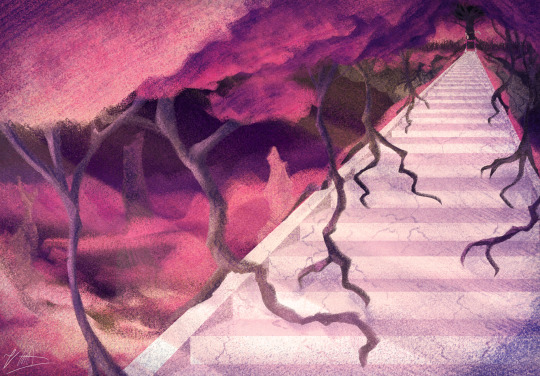
So a little while ago I did this background thingy of my interpretation of Hakugyokurou in Touhou 7, then left it at the sketch and forgot about it for a while. Then after changing up my art style a lot, I came back to this and decided to finish it as a way of testing out how my new style would look on backgrounds. Then when I finished it, I also didn't look at it for a while, until today where I decided that I liked it and wanted to post it.
Artist's Notes:
IDK how much this actually looks like Hakugyokurou tbh, but I liked the idea of there being a fuck ton of trees that just kinda grow on the stairs and Yuyuko's garden being on an island of some kind, though tbh as I write this now, this same feeling could be accomplished with just having the stairs be on top of a hill with the trees soooo... oops. IDK how mythologically/lore accurate that would be, but hey, just a cool idea I had. I feel like we need more fan interpretations of certain Touhou locations because I think those could be really fucking cool, like, I should do more of these myself because I have a fuck ton of ideas (plus I need the practice with drawing backgrounds so win-win).
Even if this... doesn't really look like Hakugyokurou in Touhou canon, this was still good practice for perspective, as well as getting better at drawing backgrounds/environment pieces (plus what annoys me is that I wanted to make the tori gate red but had to make it pink because the red was too much for the colour scheme and I should have adjusted the rest of the colours but I don't feel like going back and fucking with this piece now because I feel like I am going to end up like Sisyphus pushing a boulder up a hill with this drawing).
I think the reason we don't see those as often is because there's a lot more consistency with the location designs in Touhou than the character designs. Like, in the mainline games themselves, Marisa's outfit changes every fucking game, and small details in how characters outfits are drawn also lend themselves to that looser character design base. As long as you keep the core design philosophies of the character (i.e. Reimu keeping her loose, baggy clothes, Yukari with her hat and ribbons, Keiki with her headkerchief (I FINALLY LEARNED WHAT IT WAS FUCKING CALLED WOOHOOO!!!! I COULD HAVE JUST LOOKED IT UP ON THE WIKI THIS WHOLE TIME YAAAAAY), and many more examples) you're basically good. However, the actual locations in Touhou have been so set in stone with all the printed works that I think it's a shame we don't see any more variations of how they could look.
I'm not saying to completely ditch how each location is portrayed in games (also don't take this whole thing as me completely dissing the canon looks of the locations) but, treating the locations like character designs in and of themselves. Like, take Sakuya's canon design and her Touhouvania design. Both of them are very different takes on the same design idea. Yet you still recognize Touhouvania Sakuya as... well, Sakuya. And also, keeping the same mythological/historical/irl inspirations for said locations (again, don't know if having a floating island in the Japanese netherworld is accurate but it was a cool idea)
Some other location ideas I have include:
The SDM looking relatively normal from the outside but when you go inside it looks like a fucking gothic cathedral/castle because Sakuya keeps fucking with the space time continuum and there is also an organ the size of a fucking house in there that Sakuya dramatically plays. Also having it be surrounded by trees and having some mountains surrounding the misty lake would be cool as well.
Keiki's base in the animal spirit garden being reminiscent of the ancient technology in Laputa, some of the zonai technology in ToTK and some of the Lanayru desert buildings in Skyward Sword (i.e. Lanayru Mine, the shipyard, etc), as well as a lot of the other ancient technologically advanced sky people ruins seen in some other Zelda games, but with the clear Kofun era theming she already has.
Old Hell having a mix of western influences with it's prodominantly Japanese ones, mainly inspired by how the Palace of Earth spirits looks significantly more western than the rest of Old Hell (though that could be because it was more recently built idk), as well as there being emblems from the time that Old Hell was actually Hell being strewn about in the ruins of old hell, also being inspired by a Japanese historical anecdote about how certain families had specific crests/emblems representing them and how when a new clan would take over everything would be replaced with that families' emblem although my memory is a bit foggy (since I saw it a while ago) and I got info from a Youtube short so take this info with a huge grain of salt (and it anyone actually knows if this info is legit or not, please correct me if I get anything wrong).
Overall, don't think this looks too much like Hakugyokurou, but I am glad I drew this anyway because I needed the practice with drawing backgrounds.
#touhou project#?#art#fanart#touhou 7#perfect cherry blossom#???#some location design stuff I felt like doing#backgrounds#東方project
22 notes
·
View notes
Note
Not sure if you reblogged the same thing I did with the top fives, but you get one anyway! Tell me your top five favorite things about Logan Bush!
My friend! I’ll tell you honestly, it doesn’t matter if I reblogged a game or not because I am aaaalways ready to talk about Logan. I’m gonna babble, but I also made a powerpoint that’s easier to digest here if you’re interested- it’s … it’s got pictures 💀💀
He’s so funny. He has no business dropping lines like “you can’t buy me, like a cheap sex lady!” or “why does it look like your butt could take a sheet of fresh-baked sheet cookies out of the oven?”
Because he’s willing to challenge Louise, we get to see more from her character. She’s not bored by him, and she can’t easily push him around. He’s not someone she has to hold back with or that we have to deal with a morality lesson every time we visit this character. We get to have chaotic shenanigans and see how far they’ll go to win.
I’m not sure the creators meant to do this, but they made the perfect example of a narcissistic family dynamic with Logan as both the hero child and scapegoat. There are so many details of Cynthia pushing Logan around and Logan’s deep need to defend his space that make his traits kind of click into place for why he’s acting like the teenage dumbass that he is, which isn’t something you would expect from a high school bully. At least I wouldn’t expect it in an episodic sitcom unless it was a “very special episode.”
His family was set up as a foil family for the Belchers, which makes for really good storytelling when you want to explore socioeconomic differences and how it affects the family structure in that the more a family focuses on image the more their values shift from love to wealth.
Logan cried while watching Freaky Friday and analyzed the theme of love and acceptance found through perspective. He was also a POW breaking from torture, but you know… fun for me because it’s added depth either way. It’s interesting too that Louise punches him and he doesn’t retaliate. He operates under an “eye for an eye” philosophy, so did he decide to let that go or did he think he deserved that? I would pay real American dollars to see what the show bible says about him.
#babsbles#asks#thank you so much this healed me better than the soup and pain meds 😭#logan bush#logan barry bush#logan berry bush
22 notes
·
View notes
Note
I'm seeing Judao-captelism being use to described Jewish people who voted Republican or dont fully agree with progressive socialist ideology. It's being used by black identitarians and marxists, so hopefully it says that way.



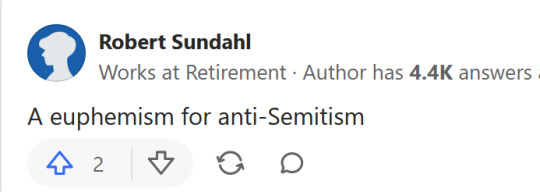

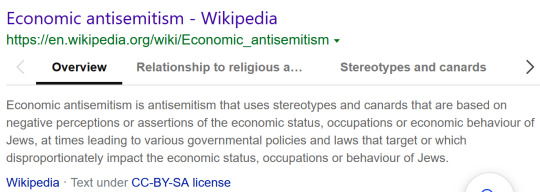

At its core, Judaism is about unity: the unity of the one G‑d, the universe and the unity of all people created in the image of G‑d. And yet, Judaism also gives the ordinary man an irrevocable right to his own property—as we see in the Torah’s division of the Land of Israel to tribes and families, as well as in the command to celebrate the Jubilee year (where all property is returned to its original owners every 50 years). The idea of land ownership by definition creates separation and division within society, contradicting the ideal of unity. How is it possible for us to live with these opposing ideals in our philosophy and practice?
____________________
Goes on with how the 'every 7 years fields are fallowed and whatever grows there is free game' evens thing out.
It's a good read, and I've got no doubt there's 47 Rabbi's with 63 different takes on the matter but it seems to be a reasonable conclusion to me.
I'd love to hear a Jewish perspective from some members of the Jewish community on all this since I'm just a gentile out here trying to do my best to help which lands me in the 'sticking with safer answers' area when complicated situations come up.
_______________
As for socialism, I could pull up Marx's take on "The Jewish Question" but it's just easier to paraphrase.
Marx's take was 'I don't mind Jewish people I just wish they weren't so Jewish' basic idea worked out to cultural genocide, everyone has to have the same celebrations, traditions and all that good stuff regardless of the history of that particular group since the group is getting absorbed into the collective.
Hopefully this here will give you the start of some tools to respond if need be, but honestly the thinking I'm having with this is the current mode is Rothschild conspiracies without the Rothschild's.
Jewish people just like everyone else are also individuals and each one will make up their own mind about whatever subjects they want, so you're gonna get these guys.
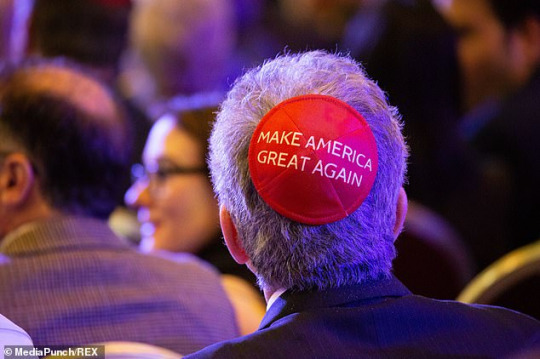
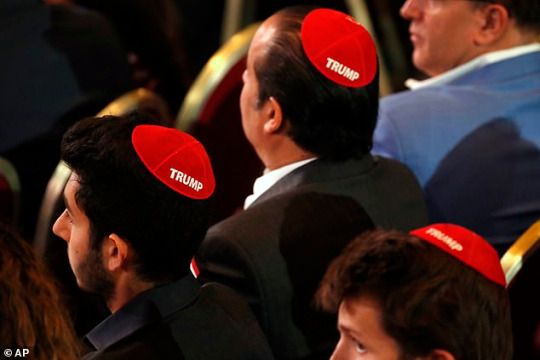
And folks in the community that actively hate the guy.
People trying to use phrases like Judeo-capitalism just show that they're willing to take a page out of the nazi playbook if it serves their purpose, much like the ones that try to claim the Jewish people today aren't the same as the one's from Jesus's time.
Genetics has proven that one wrong.
95 notes
·
View notes
Text
Circle Round: raising children in Goddess traditions, by Starhawk, Diane Baker, Anne Hill
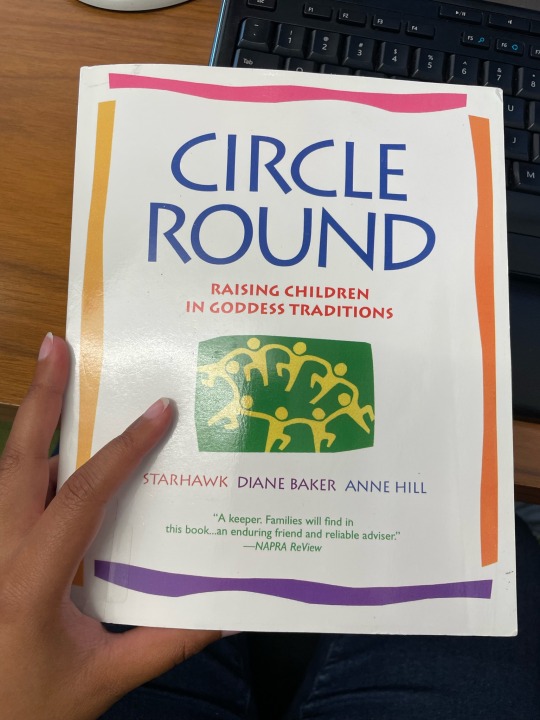
If you are curious, no, I haven't read the other, more famous Starhawk book yet. It's on my shelf. I am putting it off because the library is yelling at me to give this one back much more urgently 😅
I have read many "how to witchcraft" books, and a few "how to witchcraft (with kids)!" books as well, but this book is a gentle, loving book on how to raise your children in magically rich household, the reading experience made even richer by having multiple contributors to provide crafts, songs, rituals, and grounding for a world that isn't exactly built around Neopagan sensibilities. There are several stances the book takes right off the bat, all which I was very grateful to see:
1) Do not force your kid into anything. Force is counter productive to your endgoal: having a happy, loved family where children feel comfortable with your craft and their place in it. If you would like your child to be interested in participating, leave them as many invites and openings as there are rituals taking place, or encourage them to make something that will be part of the ritual at another point. You can do this without trying to strongarm them into it.
Yes. Absolutely. This is a great point to make up front. Especially when children can be embarrassed that their parents believe in magic, or are part of a coven that partakes in rituals.
2) Cultural appropriation is not tolerated. However. If you only expose your children to European stories, mythologies, and traditions, they are only going to see the world through a lens of eurocentrism. Diversity in materials is the key to a well-rounded view�� in life, in magic, everywhere.
When I got to this part of the book, I about stood up in my chair at work. Yes. We can appreciate, value, and learn from multiple cultures by engaging with them respectfully. It is important to be exposed to as much as possible in life, lest we become too used to only one perspective. I use the same philosophies towards diversity and global representation as I work to stock the kids' section at our library.
I loved that the book had songs (and sheet music!) in it; I loved how the book was only as feminine as you would like to engage with, even as it centers in a Goddess tradition; I loved the crafts, the recipes, and the realistic day-to-day tips, all aimed at a level where younger children could engage with the material without missing out; I loved how the collaborators rounded each other out as they went, so there was hardly a section that felt too heavy with one person and ignored the others, and everyone contributed something different to the book.
As a kids librarian, reading this book smacked me in the face with the realization that kid rituals are largely just Goddess-themed storytime sessions. If you're a children's educator in any capacity at all, ever, and the chance to read this book comes up, take it, if only for the weird feelings blending your day job with theology! 🤣
If you're very sensitive to something that "feels Wiccan", well, this does smack of it, but if your actual problem is with cultural appropriation, misogyny/misandry, transphobia, or homophobia, I am happy to say that, on my first reading, none of the issues people tend to cite as their problem with Wicca made an overt appearance. That being said, I was reading this book at a desk with many distractions.
I liked this book, I appreciate this book in its role and its content, and now that it's returned to the library, I'll likely try to purchase myself a copy.
Blessings!
53 notes
·
View notes
Text
Introduction/ The Illusion of Living

Introduction
To clarify, there are two pages of the actual "Introduction", followed by a section labeled "The Illusion of Living," which is ANOTHER introduction. I'm crying.
The FIRST Introduction is all fluff, Joey yaps to his cab driver (just known as "Simmons") and sees a Borzoi, and immediately typecasts it as a villain OC to go up against Bendy. That's it. Next section.
The Illusion of Living [The What]
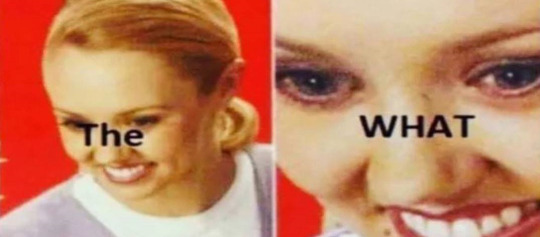
Joey does a horrible job at giving a simple explanation of the Illusion of Living, but not for the reason you'd think. At first it seems to boil down to "the art of lying" or "joey caps for five years," if you will. He also, unsurprisingly, thinks he's a genius and that his philosophy is a gift to mankind.
"It is a life philosophy, but unlike some of our great past thinkers, I did not come to any conclusion through thought and careful meditation. Instead it was born within me. My whole existence has been shaped around this concept. It just took some time for me to learn how to articulate it to others."
"I've always believed that we can communicate to even the simplest person. Communication is everything."
"We are all dreamers at heart, and I want to make sure that all of your dreams will indeed come true thanks in no small part to my unique insights."
But then Joey says something interesting for once, and it seems to imply that the Illusion of Living is a two-way street. Joey believes that reality is also fiction, but it seems to work in reverse as well.
"So in the briefest of explanations: The Illusion of Living is the art of mimicking real life on the big screen."
Real life ---> Big Screen. So not only is fiction reality, the two are interchangeable.
Illusion of Living [Bendy]

"I am a very self-aware person."

Joey goes on to talk about Bendy, but there's...another aspect I'll be sure to bring up before we close on this section.
"I am not offended that he is first in your heart. He is, after all, first in mine. He was my very first creation- one could even call him my firstborn."
"Bendy is my muse. He is also my messenger. He tells the stories of our lives in absurd, hilarious ways that put all of it into perspective. He reminds us that what we truly need in this world is joy and laughter. Money doesn't matter, power doesn't matter, not when we acknowledge the Illusion of Living."
Nathan adds a footnote here that the Illusion of Living wasn't the only thing important to Joey. He knew the value of a dollar and was a good businessman. So apparently, the money did matter after all. Are we shocked that a Capitalist required money to achieve his goals and aspirations?
"He isnt' real others might argue. Such a ridiculous argument "isn't real." We can see him, we can touch him, kids snuggle with their stuffed Bendys at night. He has more fans than the Marx Brothers! What is real if he isnt'?"
"I tell people that Bendy is the perfect example of my philosophy. He is its manifestation. Or as I like to say, "Dreams come true."
Joey isn't entirely wrong here. We see movie franchises IRL that have a huge influence on pop culture all the time, and we see fandoms and cult followings spring up from said media. The impact is real, if not the characters themselves.
"Your dreams can come true. Because, as I've explained, illusion and reality are the same thing."
Again, the Illusion of Living is an insistence that reality and fiction are one and the same.
I'm going to swap a line from the end of the Bendy section to here, because I want to touch on something I noticed afterwards.
"Now I'm getting ahead of myself. I get excited and tell the story too fast. That's what editors are for I suppose."
Nathan adds a footnote here that IOL went through three different editors, finally landing on the desk of Sandy Pommel (another rando), who opted to put back in a lot of the remarks in order to 'truly capture Drew's charm," as Nathan puts it. (My girl wanted that edit credit so bad lmfao)
ANYWAY, let's take a look at these little slices of IOL I've been saving for last.
"I tell people that Bendy came to me in a dream."
"No, what I had to do was want the dream in the first place. To know that I needed a creation so perfect, so accessible to so many people, that it would help me change the way the world saw itself. That was my dream. I was awake, I knew what I wanted; I made it happen."
He mentions wanting to "change the way the world saw itself" through bendy. Wanting to create a character that was "accessible to so many people." Later in IOL, we see Joey discuss with Abby what he wants Bendy to be like. Not Satan, he specifically clarifies, but an imp-like character, someone mischievous. We know Joey believes reality and fiction can be swapped out for each other, so that could be the world change he was talking about, but I think he also wanted people to recognize their own impish nature- getting into trouble and laughing every once in a while. Or maybe, just maybe, I've been reading the words of Joey Drew for too many hours.
"Only then did Bendy appear to me. Only then did I start working with other artists to make him a reality. But you see, I first made my dream. And then I made my dream come true.
Working with other artists, eh? Like who, Joey?
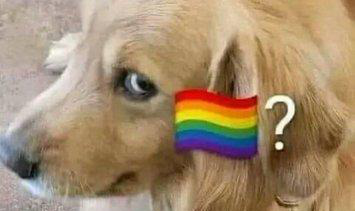
Also, note the insistence that he created Bendy first, directly after that sentence. As if trying to convince himself that Henry had no part in creating Bendy, and trying to keep his story straight in the way he wants it portrayed to the public.
(This facade later crumbles on page 154, with Joey pretending not to miss or need him at the studio and failing horribly.)
Things get really interesting when Joey describes Bendy's creation. He sees it as his big dream being fully realized. To him, this is also the"birth" of his son, or at the very least, the creation of his muse, messenger, and avenue to tell his stories. "I tell people that Bendy came to me in a dream" is a coverup of course, some smoke and mirrors to convince people that he had an epiphany and came up with Bendy himself, but he also clearly sees it as a wonderful event.
We know Henry created Bendy, of course. We know it wasn't Joey's hand that ultimately struck paper. However, that doesn't make Joey's feelings any less real.
During Bendy's creation, there are two truths happening at the same time to make the full picture. Henry drawing, and hell, maybe Joey bouncing a couple ideas off him. The process takes just minutes, but it feels like hours. Bendy is created, and Joey is there to witness it. And to Joey, it's the most perfect creation in the world. And he's going to share this creation with Henry, this dream with Henry.
I am not being hyperbolic when I say that, to Joey, Henry created his son.
TL;DR The Illusion of Living is Joey's philosophy that reality and fiction are one and the same. Joey wants his OC to be real so bad. Joey views Bendy as his actual son and Henry created him and also Joey was there for his creation so what I'm saying is Henry created a son for his business partner and they were just gonna chill like that until Henry left and broke his heart or something
#annnnd suddenly the pining for Henry makes even more sense now#the illusion of living#joey drew#henry stein#nathan arch#bendy and the ink machine
16 notes
·
View notes